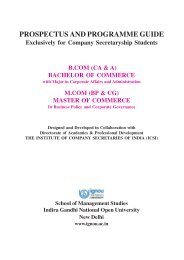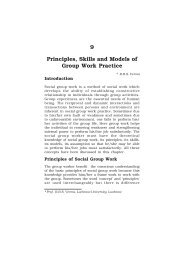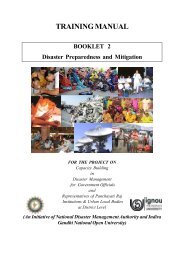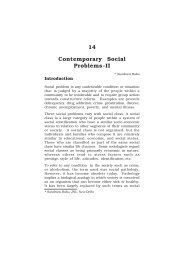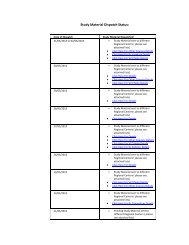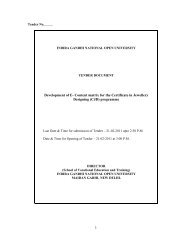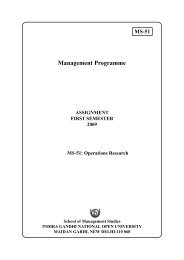PROSPECTUS AND PROGRAMME GUIDE - IGNOU
PROSPECTUS AND PROGRAMME GUIDE - IGNOU
PROSPECTUS AND PROGRAMME GUIDE - IGNOU
You also want an ePaper? Increase the reach of your titles
YUMPU automatically turns print PDFs into web optimized ePapers that Google loves.
Course 7<br />
MCO-023: Management Accounting- Strategic Management<br />
Objectives<br />
To understand the importance of strategic and risk management, and to be a facilitator and build tools for<br />
effective evaluation and controls, for strategies formulated. Also the ability to understand the risks both internal<br />
and external and build capabilities to mange risks appropriately and efficiently.<br />
Learning aims<br />
●<br />
●<br />
●<br />
●<br />
●<br />
Understand the process of strategic management<br />
Ability to analyze the performance of the organization vis a vis business environment<br />
Ability to formulate the strategy and techniques for implementation<br />
Understand the role with regard to internal control and risk management.<br />
Identify and define the risks of a business organization and evaluate & recommend alternatives strategies<br />
and identify ways of managing risks<br />
Skill set required<br />
Level C: Requiring all six skill levels - knowledge, comprehension, application, analysis, synthesis, and evaluation<br />
Section I: Strategic Management (60%)<br />
1. Introduction to Business Strategy<br />
Meaning and implications of corporate planning, long range planning, business policy planning and strategic<br />
planning; strategic management processes; meaning and use of mission, goals, objectives and targets, profit gap,<br />
sales gap, risk gap and other strategies; SWOT analysis; target selling strategy formulation and implementation,<br />
monitoring mechanism, strategies for stagnation versus growth, strategies for growth through expansion versus<br />
diversification & diversification vs core competency; Acquisition and merger strategy, strategy of joint venture<br />
both in India and abroad; Marketing strategy as a part of corporate strategy, growth under inflation and protection<br />
of shareholder, real capital; Financial objectives, non- financial objectives, resources analysis and evaluation.<br />
2. Forecasting and planning for strategy<br />
Forecast trend and changes - social, political, legal and technological impacts; Distribution channels and competitive<br />
forces. Government policies, economic growth and government expenditure; Public and private sector investments;<br />
International trade practices and government policies for capacity expansion, new industries, subsidiaries and<br />
substitutes.<br />
3. Model Building and models<br />
Strategies in the development of models, Delphi Model, econometric, mathematical programming, budgetary<br />
and heuristic model; Sensitivity analysis and the characteristics of models; Limitations in model building vis- a-<br />
vis simulation techniques; Life cycles, Porters generic strategic, Ausoj’s model, BCG matrix and other models.<br />
4. Marketing strategy<br />
Production orientation versus market orientation, marketing objectives, framework and management of marketing<br />
mix; Linkage between strategic planning and marketing strategy-both forward and backward; Research and<br />
intelligence- source for the techniques for acquiring information necessary for marketing decision-making market<br />
shares.<br />
5. Application of management accounting in strategic management<br />
Marketing strategy: analysis of marketing costs and profitability, product development policy & strategy, pricing<br />
A-47



